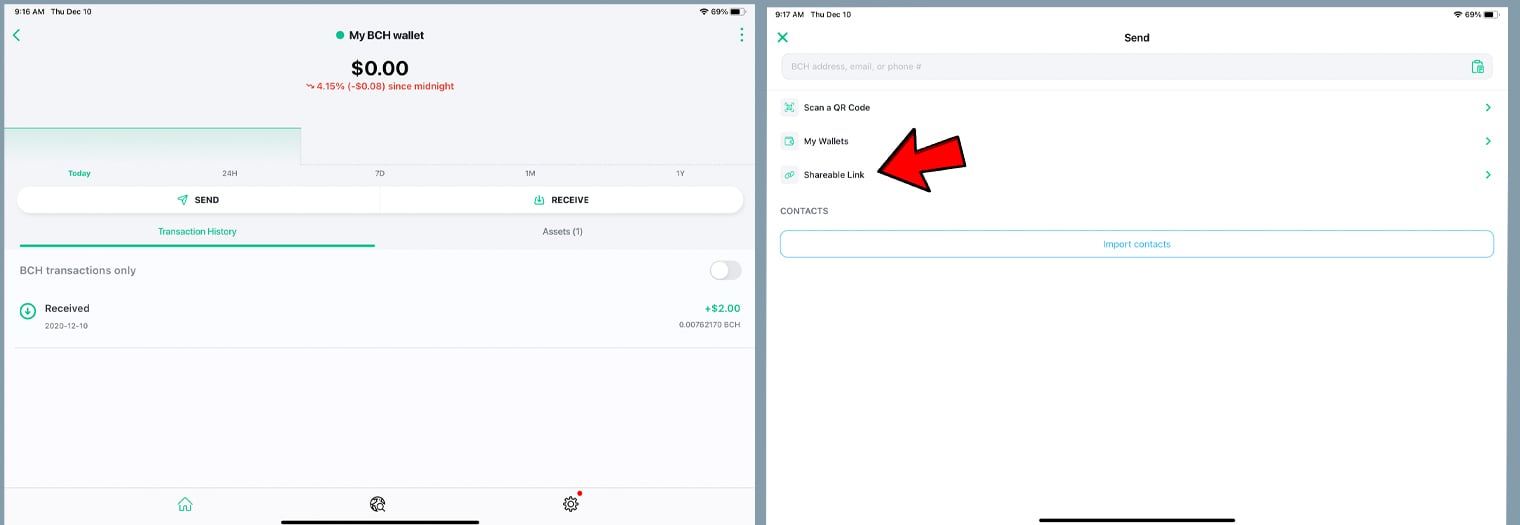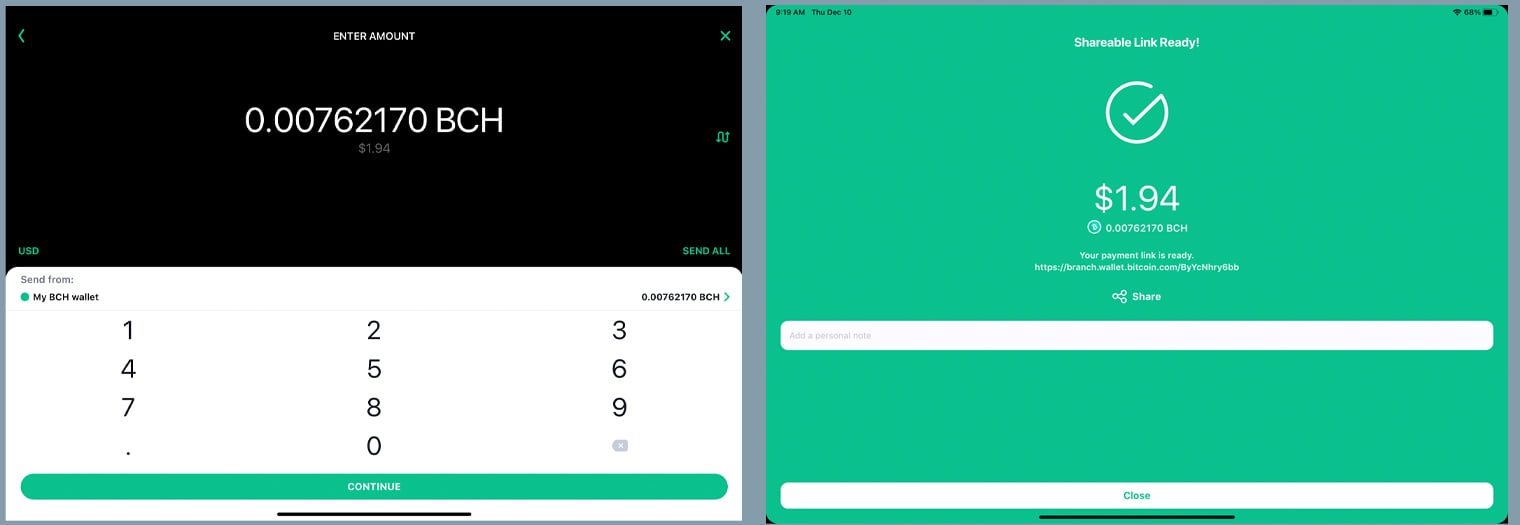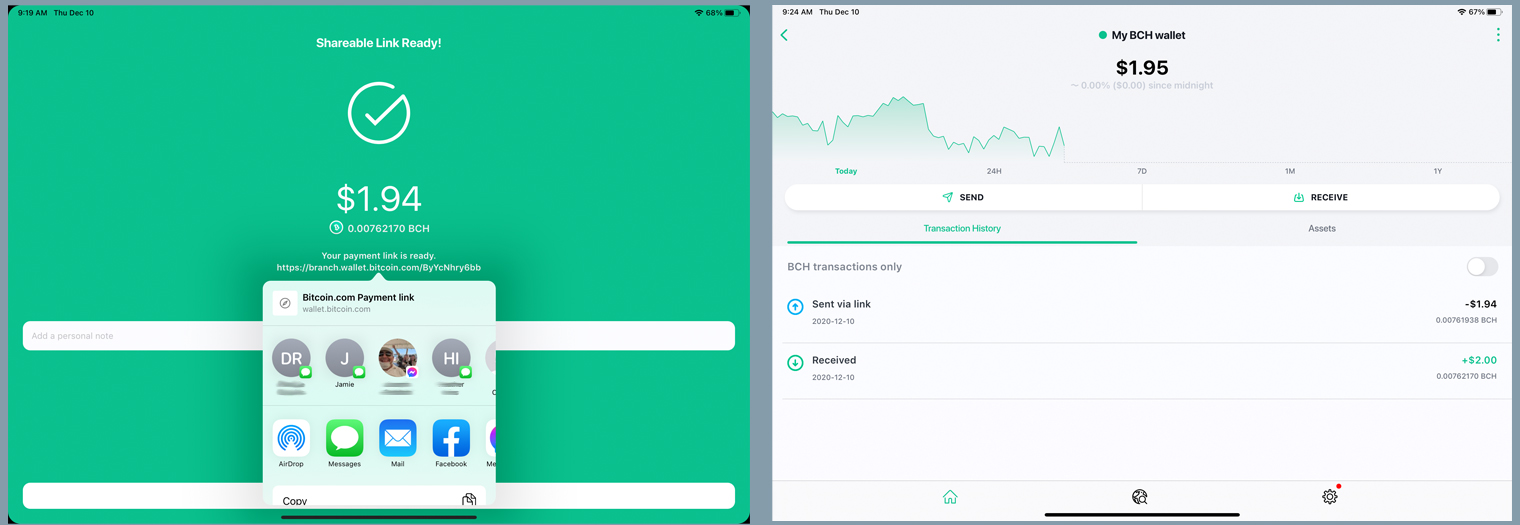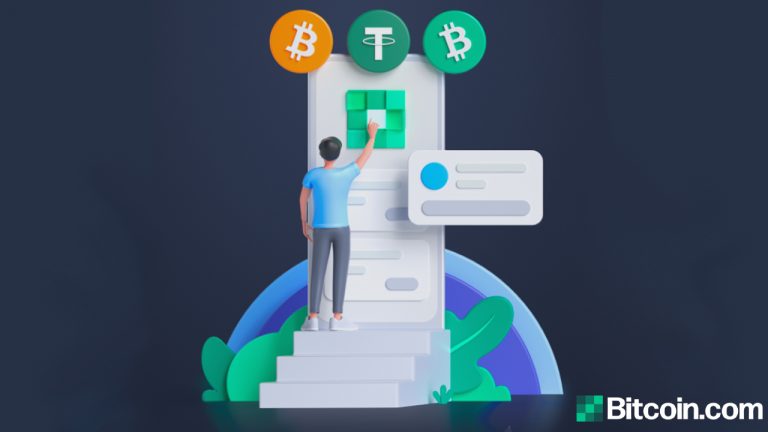- Send Bitcoins
- Introduction
- Which most describes you?
- I have never used Bitcoin before.
- I already have some Bitcoins.
- I have never used Bitcoin before.
- Setting up a Bitcoin wallet
- I already have some Bitcoins.
- Who are you sending Bitcoins to?
- Sending to another person that already uses Bitcoin
- Important: Always check the address you’re sending to
- Sending to a ‘tech-savvy’ internet user
- Sending to a friend or family member overseas
- Important: The price of Bitcoin is volatile
- Free your money and invest with confidence
- Every feature you need for economic freedom in one digital wallet
- Buy, sell, and trade
- Manage your spending
- Effortless security
- Move money freely
- Track the markets
- Is there a way to send funds from a specific bitcoin address in a wallet?
- 3 Answers 3
- Bitcoin.com Wallet Adds Shareable Payment Link Feature – Send Bitcoin Cash to Anyone via Text, Email, and Social Media
Send Bitcoins
The no nonsense guide to sending and receiving Bitcoins.
Introduction
This a no nonsense, simple guide to sending bitcoins to anyone. We’ve stripped back as much technical jargon as we can to explain all the steps involved in sending bitcoins, in their simplest form. We also cover how to overcome some common hurdles and pitfalls as well as discuss some of the most common questions people have when first encountering Bitcoin.
Which most describes you?
I have never used Bitcoin before.
You’re curious about this whole Bitcoin phenomenon, and want to send or receive Bitcoins.
The first thing you’ll need is a Bitcoin wallet.
I already have some Bitcoins.
You’re a trailblazer in the new and exciting world of crypto currency, you have them but now you want to use them.
Wouldn’t it be great if everyone you knew used it?
I have never used Bitcoin before.
You’ve taken an interest in Bitcoin, perhaps read about it and now you want to try it out for real.
This section covers the very basics of setting up your own Bitcoin wallet, acquiring some Bitcoins and sending them to another wallet.
Setting up a Bitcoin wallet
A Bitcoin wallet is an application which you can use to send or receive Bitcoins on the Bitcoin network. Setting up a wallet it simple, requires no credit checks, you don’t have to provide your postal address or provide any form of identification. In most cases, setting up a wallet shouldn’t cost you anything.
Steps to set up your wallet:
- Choose the wallet software or service to use
- Install it
- Choose a strong passphrase
- Backup your wallet
- Safely store your recovery keys
I already have some Bitcoins.
You’re the rightful owner of some Bitcoins, which hopefully means you have a Bitcoin wallet or have used a service (such as a Bitcoin exchange) to acquire them.
In this section we will cover everything involved in sending Bitcoins to another person or party. Once the basics are dealt with, we will also examine some of the differences to using Bitcoin as a payment network compared to conventional payment networks such as Visa or Master card and also looks at some of the dangers and pitfalls to avoid.
Who are you sending Bitcoins to?
This may sound a silly questions to ask, but the answer will determine how easy the task on your hands is. Let’s consider the different categories of person that you might be sending Bitcoins to.
Sending to another person that already uses Bitcoin
This is by far the easiest situation for sending Bitcoins. The other person already uses Bitcoin, and therefore will already have their own Bitcoin wallet. So sending them Bitcoins amounts to little more than asking for their wallet address. Each Bitcoin wallet has at least one wallet address linked to it (each wallet can in fact have a virtually unlimited number of addresses).
A Bitcoin wallet address looks like this:
The same address can also be represented as a QR code (similar to the one below), which makes it readable by the camera on smartphones.
Most of the Bitcoin wallet applications for smartphones allow you to scan a Bitcoin QR code as a handy way to read the address.
Important: Always check the address you’re sending to
Remember that some Bitcoin addresses are used only once while others are re-used many times. Always confirm this with the recipient which address you are sending your Bitcoins to. If in doubt, try sending a small test transaction to the address before parting with any substantial amounts of Bitcoin.
Never forget, Bitcoin transactions cannot be reversed or cancelled in the same way Credit Card transactions can be. You cannot call up your bank and ask for a Bitcoin transaction to be cancelled.
If this sounds a scary prospect to you, then checkout the saftey security tips for more information on how to avoid losing your Bitcoins.
Sending to a ‘tech-savvy’ internet user
This situation requires a little more effort, than dealing with someone who is already a Bitcoin user as you need to get the recipient to set up a Bitcoin wallet. That said, once you’ve been through this step, it’s plain sailing from there.
The key obstacles are really, down to the abilities and motivations of the recipient. Assuming they’re motivated enough to receive money from you, then the key thing to do is help get them set up with a Bitcoin wallet.
Bitcoin wallets come in a variety of forms, there are Wallet applications for Desktops PCs, Smartphones and many others. For more detail on different types of Bitcoin wallets available check out our wallets page.
For now we’re going to look at some of the easiest ways to get someone set up with a Bitcoin Wallet.
There are a few ways to go about this:
Suggest a suitable Bitcoin wallet for them to use, and advise them on installing and configuring it. More details on the various Bitcoin wallets can be found on the wallets page.
Point them to a resource (such as this very website send-bitcoins.com) and tell them to call you when they’re done installing their wallet application.
Use a service such as BlockChain.info’s ‘Send via Email/SMS’ service. This service sends the recipient a link with which they can Claim the Bitcoins which have been sent to them.
As for other methods, watch this space a tremendous amount if innovation is taking place right now. The companies, organisations and individuals involved in the Bitcoin economy are focussing heavily on building services and applications on top of the Bitcoin network, with new announcements being made almost on a weekly basis.
Sending to a friend or family member overseas
One of the most popular examples of Bitcoin’s usefulness is for people working away from home wishing to send remittances back home to their family. The combination of lower fees (compared to existing money transfer services) and simplicity mean that ever increasing numbers of people are looking to Bitcoin as an alternative method of payment when sending overseas.
There are a range of potential obstacles to negotiate here, alongside helping your friend or family member set up their wallet.
Legality
One important concern is the legal status of Bitcoin in the country where the recipient lives. Currently Bitcoin is viewed very differently by governments around the world. Countries such as Russia, China, Thailand and Vietnam have imposed legal restrictions (and in some cases bans) on the use of digital currencies.
Some of the more Bitcoin friendly countries have begun moves to tax Bitcoin or Bitcoin related transactions. Therefore it’s important ensure that both you and the recipient understand the legal status and tax laws surrounding Bitcoins in your respective countries.
The legal status of Bitcoin is being considered by governements all over the world and the Legal status in a particular country is subject to review as goverments seek to understand what Bitcoin is. There are a number of online resources and new outlets which cover this in detail. Our ‘Bitcoin and the Law’ page for more information.
Many governments are actively looking at how they can tax Bitcoin. Along with the legal status, this is an area which will undergo a great deal of change as tax policies evolve. Check out our ‘Bitcoin and the Law’ page for more information.
Bitcoin adoption in the destination country
Assuming you have overcome the hurdle of getting a wallet set up and your freind or family member is ready to receive your Bitcoins, there is still the question of what they can to with them at the other end. For instance:
Are there Bitcoin exchanges set up in their country where they can exchange their Bitcoins back to their local currency?
Is there a market for Bitcoin in that country?
Do shops or businesses accept it and are people willing to accept it in exchange for work or labour?
That said, Bitcoin adoption is growing very steadily all over the world with more and more businesses (especially online businesses) are now accepting it as a payment method.
Of course, not everyone wants to spend their Bitcoins, they may wish to hold on to them until they have more options to spend them, or simply hold them as an investment.
Important: The price of Bitcoin is volatile
Bitcoin is a relatively new technology and this can mean large swings in its price often take place as the Bitcoin economy and trust in the technology grows. This means, on any given day, the price someone will pay for your Bitcoins, or the price you pay in Bitcoins for a particular good or service, can be significantly greater or smaller than it was the previous day.
Its important to understand that holding significant amounts of Bitcoin for a long period of time carries some risk of losing its value. As with any investment, never invest more than you can afford to lose.
If you thought this guide was useful, please donate to help us keep it running
Источник
Free your money and invest with confidence
Your gateway to Bitcoin and beyond. Buy, sell, trade, and invest in one safe and simple app.
Every feature you need for economic freedom in one digital wallet
Buy, sell, and trade
Build and manage your crypto portfolio from your mobile device. Buy with your credit card, payment app, or bank account. Instantly swap between cryptocurrencies. Protect your returns by trading into USD stablecoins.
Manage your spending
Create вЂsaving’ and вЂspending’ wallets to organize your funds. Add personal notes to transactions and get a complete history of buys, sells, trades, and spends.
Effortless security
Hold the keys to your digital assets in a wallet so secure, no one can access it except for you — not even us. Protect your money with passcode and biometric security features. Automatically back up all your wallets and restore access with a single custom password.
Move money freely
Send and receive cryptocurrencies anytime, anywhere — no questions asked. Take advantage of fully-customizable fees for sending. Create unlimited wallets to support your privacy.
Track the markets
Stay informed with real-time market data displayed on your home screen. Get in-app access to the news that matters. Receive notifications when the market is moving.
Get the support you need
Use these comprehensive guides to understand the fundamentals of Bitcoin and cryptocurrencies. Watch our easy-to-understand tutorials and become a power user in no time.
What is Bitcoin?
Bitcoin is based on the ideas laid out in a 2008 whitepaper titled Bitcoin: A Peer-to-Peer Electronic Cash System
How do I create a Bitcoin wallet?
Creating a Bitcoin wallet is as easy as installing software on your mobile device or computer
How do I receive bitcoin?
To receive bitcoin, simply provide the sender with your address. You just need to make sure you’re providing the right one.
What is Bitcoin?
Bitcoin is based on the ideas laid out in a 2008 whitepaper titled Bitcoin: A Peer-to-Peer Electronic Cash System
How do I create a Bitcoin wallet?
Creating a Bitcoin wallet is as easy as installing software on your mobile device or computer
How do I receive bitcoin?
To receive bitcoin, simply provide the sender with your address. You just need to make sure you’re providing the right one.
Get the most out of your new Bitcoin Wallet
Subscribe to our Bitcoin Wallet updates to learn more about awesome new features as soon as they’re added
Источник
Is there a way to send funds from a specific bitcoin address in a wallet?
The first result from Google gave me an answer from 2012 so I wondered if there was a better one than ‘use armoury’ now?
It’s fine if I have to decode the raw transactions, I would be grateful if someone could take me through the steps.
Thanks in advance 🙂
3 Answers 3
I’ll answer my own question,
It was unbelievably easy. (from the debug console or command line)
produces a/the list of unspent outputs at your disposal. Make a note of the ‘txid’, ‘vout’ and ‘scriptPubKey’ of each output you wish to use.
Use the ‘createrawtransaction’ command followed by a list of dictionaries containing the txid’s and vout’s of the inputs you chose earlier followed by the addresses you wish to send them to (the send to addresses are in a single dictionary, not a list of dictionaries).
If you don’t want to send the outputs in total (you want some change for yourself) you will need to include an address that you control in your sending dictionary (from your wallet or somewhere else) since outputs cannot be partially spent, sorry.
To pay the mining fee simply leave some of the total output amount unaccounted for and bitcoin will use it as the mining fee by default (fee is 0.0001 at time of writing).
If all went well you should be given a hex string.
Use the ‘signrawtransaction’ command to check there are no errors by passing in your new hex string followed by a list of dictionaries with the txid’s, vout’s and scriptPubKeys we got at the very beginning of all this.
note: in newer versions of bitcoin the list of dictionaries is not required
If you got a new hex with «complete» : true after it then all went well and you can now use the ‘sendrawtransaction’ command followed by the even newer hex you were just given to broadcast your newly created transaction into the bitcoin network.
If you managed to sign it successfully but get a «code»:-22,»message»:»TX rejected» error please see the footnote below.
Notice it only took four commands in total:
Be aware if you designate an unusually large fee like 0.5btc (I tried this on the testnet) the network will reject your transaction when you try to broadcast it because it thinks you’ve made a mistake which I discovered whilst I was experimenting.
(This is also the case if you are trying to spend more BTC than you have available.)
In the end I set the fee to 0.001 and it worked fine, here is a link to my question regarding this situation.
Источник
Bitcoin.com Wallet Adds Shareable Payment Link Feature – Send Bitcoin Cash to Anyone via Text, Email, and Social Media
At Bitcoin.com, our team is all about spreading the benefits of peer-to-peer electronic cash and our flagship wallet is a testament to our team’s passion. Bitcoin.com’s noncustodial crypto wallet recently upgraded and now offers a new payment link feature that allows anyone to send bitcoin cash by email, and even social apps like Whatsapp, Facebook, Slack, Telegram, and Instagram.
Just recently the Bitcoin.com Wallet added a number of new features in the latest 6.10.3 version release. The Bitcoin.com Wallet is a noncustodial bitcoin cash (BCH) and bitcoin (BTC) client that also allows users to store SLP-based tether USDT stablecoins, and Simple Ledger Protocol tokens as well.
In the latest edition of the Bitcoin.com Wallet, our software development team has made it much easier to send transactions in a few different ways. On November 24, the BCH proponent David Bond (@hellodavidbond) tweeted about the Bitcoin.com Wallet’s new “Send Anywhere” feature.
“The Bitcoin.com Wallet now allows you to send [bitcoin cash] the same way you’d share a link, or meme. This is awesome,” Bond tweeted.

With the new Send Anywhere feature from the Bitcoin.com Wallet, sending BCH gifts during Christmas or during the Chinese New Year has never been easier. In order to leverage the new Send Anywhere feature, Bitcoin.com Wallet users need to upgrade to the latest 6.10.3 client version.
After depositing some funds into the BCH wallet, simply press “send” to create and send a shareable link. In addition to sending to any BCH wallet by scanning a QR code or sending to one of your own BCH wallets, the client offers a choice called: “shareable link.”

Following pressing the “shareable link” tab, the wallet directs you to the page where you enter the amount of bitcoin cash you want to send. With my test wallet containing $2 in bitcoin cash (BCH), I simply pressed “send all,” and pressed “continue” to finalize the transaction. After pressing “continue,” the Bitcoin.com Wallet will create a URL link with the bitcoin cash that can be sent using nearly any application on the web.
You can send the shareable link via text message, email, Twitter, Facebook, Whatsapp, Slack, Telegram, and basically anywhere you can share a link. Now, remember, you probably want to send the link privately, rather than sharing it in public, as anyone with access to the link can scan the funds.

After the creation of my $2 BCH payment link, the Bitcoin.com Wallet gave me a choice to send it via a myriad of applications on my device. Since this was only a test, I sent the bitcoin cash to myself via SMS text message, and instantly received the shareable link.

Источник


